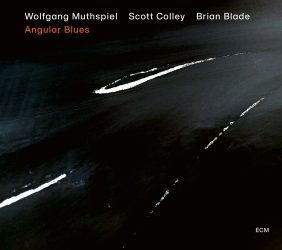Jazz Album Review: Wolfgang Muthspiel’s Superb “Angular Blues”
By Michael Ullman
The precision and inventiveness of Angular Blues more than meets our high expectations for this terrific trio.
Angular Blues, Wolfgang Muthspiel with Scott Colley and Brian Blade. (ECM)

The third number on this beautifully realized, spacious album from a trio led by Austrian guitarist Wolfgang Muthspiel is the folksy “Hüttengriffe,” which I, via my schoolboy German, translate as “Hut Handles.” Unsure of myself, I wrote Muthspiel’s publicist, Antje Hübner. She sent me this translated explanation of the title from the guitarist. The piece starts with three chords: “These are actually the first chords you learn on the guitar. I call them hut chords, because I imagine how you can take a slightly detuned guitar hanging on the wall of a mountain hut, take it down and play first chords that a lot of people can play and that everyone can learn very quickly…. I always liked this amateurish aspect of the guitar, the fact that it is also a mass instrument. The piece starts with those chords and is the easiest I have ever written. In English maybe the word “Campfire Chords” would be a close relative.” The tune’s simplicity is affecting: “Hüttengriffe” is a quiet, contemplative piece, its pauses filled by round, resonant notes, always the perfect ones, by bassist Scott Colley with support from Brian Blade’s brushes on his snare, accented by an occasional splash on cymbals. It’s difficult for sophisticated musicians to attain this level of transparency. The music shines.
Muthspiel plays the first three pieces on acoustic guitar, the last six on electric. The opening number, “Wondering,” begins with Blade taking a short solo that introduces Muthspiel’s chording. Surprisingly, bassist Colley plays the melody, with his usual warmth and subtlety. Muthspiel takes over with a thoughtful solo over Blade’s dancing, varied accompaniment. Even when the guitarist is on his own, one hears the trio as a whole. The humorous “Angular Blues” gives us Muthspiel deliberately picking out notes that make up the typical blues: he comes to a complete stop at the end of a chorus. He then plays with significant pauses, so that Colley and Blade can fill in, the way some spouses end each other’s sentences. The exchange is so natural (and amusing) you barely notice how much skill and sensitivity it takes to pull this off. Introduced via a chorus from solo guitar, “Camino” is a slow ballad that contains some fascinating changes: yes, Muthspiel can do that too.
For the first time on an ECM recording, Muthspiel also plays two standards: “Everything I Love” and “I’ll Remember April.” Of course, the latter has been memorably recorded by Charlie Parker, but also by Clifford Brown, Sonny Rollins, Lee Konitz, and Jim Hall. Muthspiel goes his own way. He introduces the familiar melody over a rapid tapping generated by Blade, along with repeated notes on bass and plucked guitar. When Muthspiel plays the first section of the melody, it’s as if the rhythm section is bound to a restrictive pattern; they are released when Colley takes the first solo. It’s a memorable — and idiosyncratic — interpretation. For complexity’s sake, Muthspiel has included a solo guitar piece, overdubbed, whose title is a perfect description: “Solo Kanon in 5/4.” “Ride” is an uptempo piece played with the precision and inventiveness that more than meets our high expectations for this trio.
Michael Ullman studied classical clarinet and was educated at Harvard, the University of Chicago, and the U. of Michigan, from which he received a PhD in English. The author or co-author of two books on jazz, he has written on jazz and classical music for the Atlantic Monthly, New Republic, High Fidelity, Stereophile, Boston Phoenix, Boston Globe, and other venues. His articles on Dickens, Joyce, Kipling, and others have appeared in academic journals. For over 20 years, he has written a bi-monthly jazz column for Fanfare Magazine, for which he also reviews classical music. At Tufts University, he teaches mostly modernist writers in the English Department and jazz and blues history in the Music Department. He plays piano badly.
